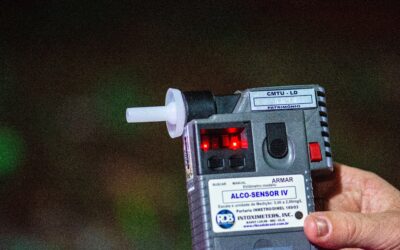A DWI traffic stop occurs when a Minnesota law enforcement officer apprehends a driver who is suspected of operating under the influence of alcohol or drugs. Law enforcement often stops drivers who are driving “suspiciously” or not obeying traffic laws. While these stops aim to enhance road safety, they also raise questions about individual rights and legal boundaries. Understanding your rights and responsibilities when you are suspected of DWI is essential to ensure a smooth interaction and protect your legal interests.
Understanding the Purpose of DWI Traffic Stops
The primary aim of a DWI stop is to enhance road safety by discouraging and identifying drivers who may be operating vehicles while under the influence of alcohol or drugs. Law enforcement agencies may be on the lookout for intoxicated drivers in areas with a history of alcohol-related incidents or during times when the likelihood of impaired driving is higher, such as holidays or weekends. By interacting with drivers and assessing their sobriety, law enforcement works to prevent drunk driving. Theoretically, this is achieved by acting as a deterrent, protecting public safety by removing impaired drivers from the road, raising awareness about the dangers of impaired driving, holding individuals accountable for their actions, encouraging sobriety testing through field and chemical tests, and gathering data to better understand and address trends in impaired driving.
While DWI traffic stops play a vital role in promoting safer roads, they also raise concerns about individual rights, making it essential for drivers to be aware of their rights and responsibilities when they are pulled over.
Your Rights at a DWI Traffic Stop
As a driver, you have certain rights when interacting with law enforcement.
Right to Remain Silent: One of the fundamental rights you possess when you are pulled over is the right to remain silent. This means that beyond providing your identification and necessary documents, you are not obligated to answer additional questions posed by law enforcement officers. This right safeguards you from potentially incriminating yourself or providing statements that could be misinterpreted and used against you later in court. By exercising your right to remain silent, you can avoid inadvertently saying something that may impact your case negatively. It’s important to remember that while being cooperative is essential, you have the legal right to limit your responses and seek guidance from an attorney before providing further information.
Right to Refuse a Search: Another crucial right during a DWI stop is the right to refuse consent for a search of your vehicle. Law enforcement officers typically require your consent to search your car unless they have probable cause to suspect illegal activity. If you choose not to grant consent, you can kindly but firmly communicate that you do not consent to a search. It’s worth noting that if officers have reasonable grounds to believe there’s evidence of a crime in your vehicle, they may proceed with a search without your consent. Understanding this right empowers you to protect your privacy and personal belongings while also remaining aware of situations where searches may be conducted under specific circumstances.
Right to Legal Representation: Should you find yourself arrested for DWI, it’s crucial to know that you have the right to legal representation. Contacting an attorney is strongly advised to safeguard your rights, interests, and navigate the legal process effectively. An experienced DWI attorney can guide you through the complexities of your case, ensuring you understand the charges against you, the potential consequences, and the best course of action moving forward. Your attorney will work tirelessly to build a strong defense, scrutinize the evidence, and advocate for your rights in negotiations or court proceedings. Having legal representation offers you the opportunity to make informed decisions, receive guidance, and enhance your chances of achieving a favorable outcome in your DWI case.
Your Responsibilities during a DWI Traffic Stop
While you have rights, there are also responsibilities to follow when you are pulled over for suspected DWI.
Compliance with Law Enforcement: When you are pulled over, one of the crucial steps to remember is to cooperate with law enforcement officers. This involves providing the requested documents, such as your driver’s license and proof of insurance. By promptly furnishing these documents, you demonstrate your willingness to adhere to legal requirements and facilitate a smooth interaction with the officers. Cooperating in this manner also sets a positive tone for the encounter and helps create an environment of mutual respect.
Avoid Escalation: It’s essential to approach the interaction with a calm and composed demeanor. Maintaining your composure and being respectful towards law enforcement officers is pivotal. Avoid engaging in confrontations, arguments, or any behavior that could escalate the situation. An escalated situation not only complicates matters but can also lead to further legal complications. By remaining respectful and composed, you enhance the likelihood of a non-confrontational exchange, fostering a more productive dialogue between you and the officers.
Avoid Self-Incrimination: While it’s important to provide the necessary identification and documentation, you should refrain from making self-incriminating statements. You are not obligated to admit to any wrongdoing or discuss potentially incriminating details. Even if you feel pressured or anxious, remember that your right to avoid self-incrimination is protected. Any statements you make during the interaction can be used against you later, so it’s advisable to stick to providing essential information and avoiding conversations that may compromise your defense. By understanding this principle and exercising caution with your words, you protect your legal interests and preserve your rights throughout the encounter.
The Importance of Legal Counsel
Navigating a DWI traffic stop requires awareness of your rights and responsibilities. Understanding how to navigate these encounters can help you protect your legal interests and ensure a smoother interaction with law enforcement. If you ever find yourself facing DWI charges, enlisting the support of skilled legal professionals can make a significant difference in the outcome of your case.
When individuals are charged with DWI, Sieben Edmunds Miller is committed to providing comprehensive and tailored legal assistance. Our experienced criminal defense attorneys bring a wealth of knowledge to these cases, offering vital support at every step of the legal process. We begin by conducting a thorough evaluation of the case, scrutinizing the specifics of the DWI stop, analyzing evidence, and assessing the legality of the traffic stop itself. With a keen focus on protecting constitutional rights, we meticulously examine whether any violations occurred during the stop, such as unlawful searches or failure to inform you of your rights.
Our legal team‘s acumen extends to crafting effective strategies tailored to each client’s unique circumstances. This includes negotiations with prosecutors for favorable outcomes, seeking alternative penalties, or tenaciously representing clients at trial if needed. Our negotiation skills and trial advocacy experience enable us to explore all avenues to minimize the impact of DWI charges. Throughout the process, we prioritize open communication, ensuring you understand your rights, options, and the progress of your case.
Being charged with DWI as a result of a traffic stop can be overwhelming, but with Sieben Edmunds Miller, you gain a dedicated legal partner who is committed to your defense. Contact us to get started.


